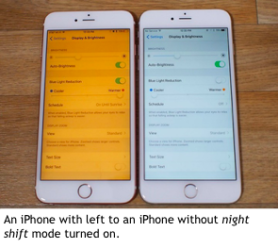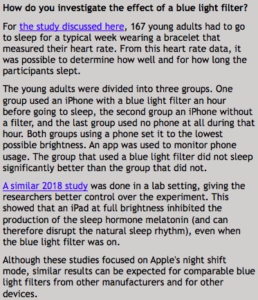Sleep
This is how your phone (no longer) keeps you awake
By Lukas Graff

It seemed perfect: the blue-light filters that suddenly appeared on all computers and smartphones. You press a button in the evening and your screen light takes on an orange hue, so nighttime screen use no longer keeps you from sleeping. But unfortunately, recent American research into the blue light filter on smartphones does not indicate that they are actually effective. Does this mean that you should not use screens at all in the evening if you want to sleep well? Fortunately not! Under the right circumstances, screen use can even help improve your sleep, according to Dutch research.
Smartphones and computers have a bad reputation when it comes to a good night’s sleep. You have probably experienced yourself that you fall asleep less quick if you use those devices all evening. This effect is confirmed by several studies. The manufacturers of these devices are also aware of this, so they have tried to find a solution based on scientific knowledge.
It is easy to imagine why they sought this solution in the light emitted by screens. We use light not only to see, but also to regulate our biological clock. Our eyes contain special receptors for daylight. If they catch a lot of daylight, a signal is sent to the brain that it is daytime and you should stay awake. The production of the sleep hormone melatonin is inhibited then. In the evening when it gets darker, your body makes melatonin and you get sleepy. Because daylight contains a lot of blue, these daylight receptors are very sensitive to blue light (and also to white light, because it contains all colors). The advice is therefore to expose yourself as little as possible to blue light three hours before going to sleep. A good idea, then, to filter that blue light from your screen in the evening, you might say.
There’s more going on
So how come researchers found no effect when a group of young adults used night shift , the blue light filter on their iPhone? Dr. Luc Schlangen, senior researcher at Eindhoven University of Technology, can think of several causes.
First, the type of activity you engage in on your phone matters a lot. Do you use your phone to relax or is it perhaps a source of stress? Schlangen himself has conducted research that shows that you are less likely to fall asleep when you use social media on your phone in the evening. But he also discovered that watching TV or series on your phone can actually improve your sleep. In addition, computers and mobile phones can sometimes be addictive, causing you to simply go to sleep too late. Of course, a light filter has no influence on these kinds of aspects.
Blue light certainly also has a major influence on sleep quality, but Schlangen puts the role that screens play in this in perspective. For example, a smartphone is almost never the only light source switched on in the three hours before going to sleep. The lamps that are switched on in the evening often cause almost as much or sometimes even more activation of your daylight receptors than your screen. Schlangen: ‘Of course it makes little sense to use a night shift mode on your phone while you just have your bedroom lighting fully switched on.’ Again, a warmer, yellowish light is less sleep-disrupting than an equally bright, cooler, bluish light.
But it’s not just the amount of blue light you get in the evening that determines how well you sleep. The amount of light you get during the day is also very important. Our biological clock is also sensitive to the difference in light intensity between day and night. ‘A lot of light during the day makes you a bit more resistant to the sleep-disrupting effect of light in the evening and at night’,Schlangen explains. If, on the other hand, your workplace is mainly lit with electric lamps during the day and you watch Netflix with similar lamps in the evening, it is difficult for your body to know when night has started.
‘Take a walk outside during the day, too,’ Schlangen advises. Outdoor light is 10 to 1000 times stronger during the day than the often artificial light from lamps and screens indoors. So the postmen and roofers are lucky, but if you have to be inside for work, it also helps to work as close to a window as possible.
A good night’s rest
Are blue-light filters like Apple’s night shift completely pointless then? Schlangen doesn’t think so: ‘It is sensible to dim your screen and make it less blue-rich, but you shouldn’t expect too much from it.’ Also dim the ambient light in the evening, make sure you see enough daylight during the day and only do relaxing activities before going to sleep. When you do all that, using a blue light filter and dimming your screen brightness can be the last step to a good night’s sleep.

